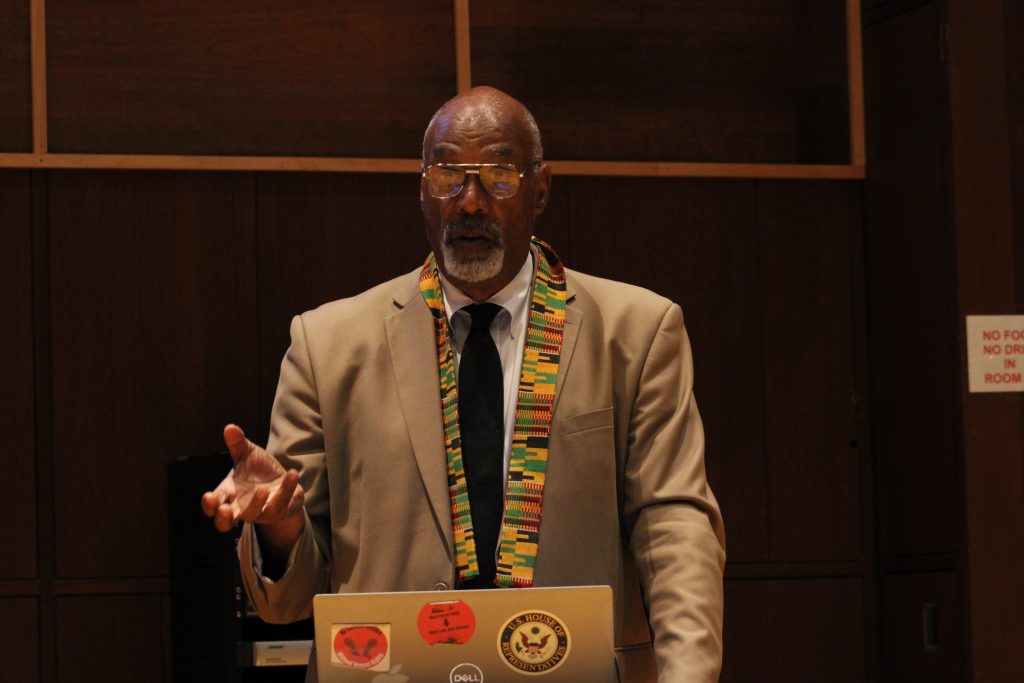The Human Rights Institute hosted Aaron Mair ‘84, an activist and former Sierra Club president, for a discussion exploring intersectionality and the climate crisis on Thursday.
The lecture, held in Casadesus Recital Hall, highlighted the several dimensions of the climate crisis. Following the call to action by the United Nations COP 28 — an international summit where nations gather to negotiate responses to climate change — Mair discussed the disproportionate impact climate change has on marginalized communities, advocating for an intersectional approach, addressing the needs and vulnerabilities of various groups.
The institute’s co-directors — David Cingranelli, a professor of political science, and Alexandra Moore, an English professor — were two of the event’s primary organizers. Cingranelli shared his thoughts on the importance of fostering discussions around environmental issues.
“Climate change is one of the most significant threats to human dignity,” Cingranelli wrote in an email. “I expect that more and more people will come to realize the magnitude of the threat. As a result, I expect that there will be increasing activism, especially on college campuses, because young people have the most at stake.”
Mair is a prominent environmental advocate dedicated to promoting and preserving a clean and healthy environment. He joined the Adirondack Council in May 2021 and has been an environmental justice pioneer for 40 years, focusing on health, climate change disparities and wilderness protection. He was the 57th president of the Sierra Club — the organization’s first Black president — and served as the chair of the New York State Atlantic chapter. Recognized for his commitment to environmental justice, Mair has spent his career championing the rights of marginalized communities and advocating for equitable solutions to environmental challenges.
In his presentation, Mair addressed existing disparities within the climate crisis and the urgent need for equitable climate action. He emphasized that both communities in the United States and nations in the Global South are impacted by the crisis, particularly in nondemocratic countries.
“We’ve got hundreds of wilderness activists that have been killed, murdered, shot, not only in Africa, but also in Central America, Latin America, heavily massacred in Brazil,” Mair said. “And again, not only for the sake of just protecting the environment, but for trying to protect our species and also the resource depletion by which all communities are dependent [on].”
Mair discussed exploitation by political figures, corporations and billionaires, describing the devastation New Orleans faced during Hurricane Katrina, which disproportionately impacted Black, working-class residents. The damage from the storm was exacerbated by discriminatory housing policies, displacing large portions of the Black population after the hurricane. Mair said natural disasters like Hurricane Katrina led to “wealth creation off of of a crisis on the backs of communities of color.”
He urged students to engage with their communities to enforce meaningful change, spotlighting the vital roles young activists play in addressing environmental and human rights challenges. He said the battle is about humanity, both intersectional and intergenerational.
“I think someone mentioned that that term, intersectionality, is kind of overused, we hear it everywhere,’” Mair said. “But it’s an analytical lens and framework, and that’s what universities give you, analytical lenses and frameworks by which we can achieve great breakthroughs.”
Throughout the lecture, Mair emphasized that both scientific understanding and a strong awareness of social justice issues are required when addressing climate change. He said communities of color have historically been at the forefront of the fight against climate change, requiring inclusive and equitable solutions.
Mair also expressed his commitment to rallying support and calling for collective action to incite change. He encouraged students to vote to enact political change to do “what is right, not just for our nation, come November, but for humanity.”
With ongoing support from the Human Rights Institute, the campus community can expect continued efforts to address the pressing issues introduced in Mair’s discussion. During the winter semester, students will have the opportunity to take a new course, “Climate, Crime & Human Rights,” that will explore narratives around eco-terrorism, the Flint water crisis and Hurricane Katrina. Moore described the institute’s continued commitment to addressing human rights and environmental concerns.
“The Human Rights Institute helps to support the Food Justice Working Group which does research and participates in advocacy activities around environmental and food sustainability and food justice on our campus, in our community, and in New York state,” Moore wrote. “We also work closely with the Sustainable Communities Transdisciplinary Area of Excellence on research talks, workshops, and other events about the intersection of climate change and human rights.”



